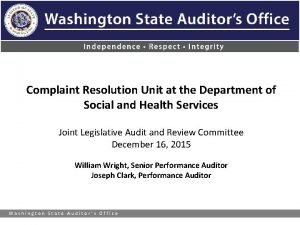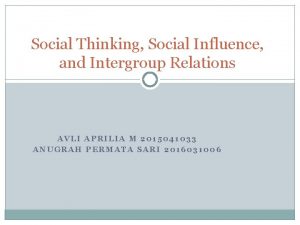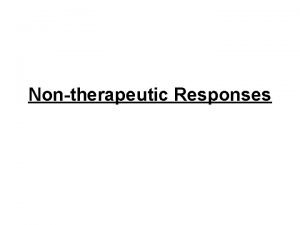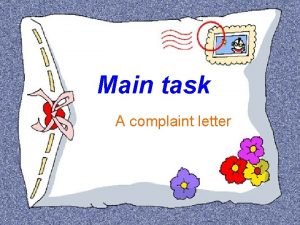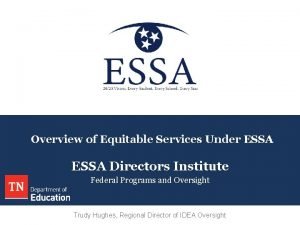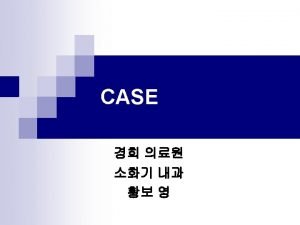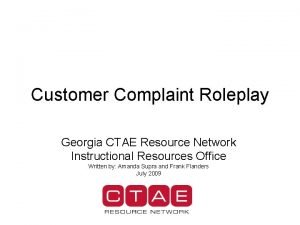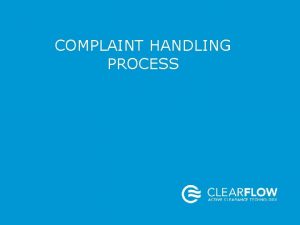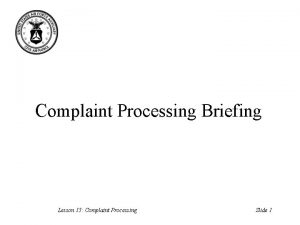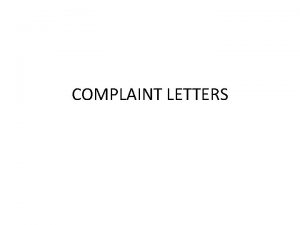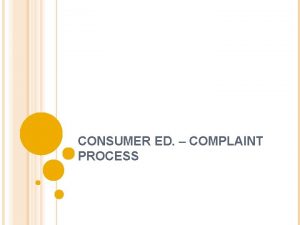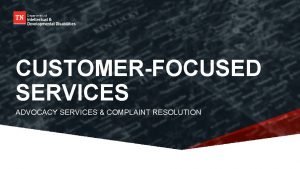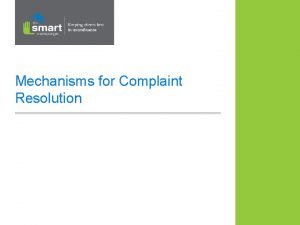Complaint Resolution Unit at the Department of Social



















- Slides: 19

Complaint Resolution Unit at the Department of Social and Health Services Joint Legislative Audit and Review Committee December 16, 2015 William Wright, Senior Performance Auditor Joseph Clark, Performance Auditor Washington State Auditor’s Office

Why we did this audit ü Vulnerable adults in residential facilities are at risk of abuse and neglect ü The Complaint Resolution Unit (CRU) struggled to meet time standards in the past ü Stakeholders expressed concerns about the accuracy and consistency of complaint assessments Washington State Auditor’s Office 2

What is the CRU? The CRU, within DSHS’ Residential Care Services Division, receives and processes allegations of: § Abuse, neglect and exploitation of residents § Provider practice issues Complaints § Can be submitted in a variety of ways § Can be submitted by anyone, including residents, families and providers § Can be submitted anonymously Washington State Auditor’s Office 3

CRU overview FY 2015: The CRU processed more than 28, 000 complaint intakes ü The CRU assigns intakes to field staff for investigation ü The CRU refers intakes to other jurisdictions, such as Adult Protective Services and law enforcement. Washington State Auditor’s Office Residential care settings § Adult Family Homes § Assisted Living Facilities § Nursing Homes § Intermediate Care Facilities for Individuals with Intellectual Disabilities § Certified Residential/ Supported Living Programs 4

Timeliness requirements The CRU is subject to state and federal requirements that determine how quickly it must act State law ü Initiate a response within 24 hours of knowledge of a report Federal regulation ü High priority complaints must be investigated within two working days ü All other complaints must be prioritized within two working days Washington State Auditor’s Office 5

CRU staff prioritize every intake The CRU’s priority scale determines when an investigation should begin Response time to start an investigation Immediate jeopardy (2 working days) Urgency Higher priority 10 working days 20 working days 45 working days Quality review Washington State Auditor’s Office Lower priority 6

Audit objectives Our audit addressed the following questions: Are complaints processed and referred in a timely manner and if not, why not? Can improvements be made? Are complaint severity assessments accurate and consistent and if not, why not? Can improvements be made? Washington State Auditor’s Office 7

The CRU relies on an inefficient voicemail system § Voicemail requires listening, replaying, transcribing, and sometimes additional review by other staff § The CRU’s reliance on voicemail contributes to delays § Delays in processing could lead to delayed investigations Washington State Auditor’s Office 8

The CRU had a significant backlog in early FY 2015 § In first three months of FY 2015 the CRU did not process 62% of intakes within two working days (backlog) Overall intakes Delayed intakes Completed timely 38% Washington State Auditor’s Office Delayed 62% 3 -4 days 38% 5+ days 62% 9

Backlog dropped when transcriptionists were hired Number of intakes processed in more than two working days Washington State Auditor’s Office 10

Online reporting may reduce reliance on voicemail The CRU recently implemented online reporting § Common practice in many states § States say there are benefits when implemented wisely § Potential as a long-term solution Washington State Auditor’s Office 11

The CRU is also subject to state law requirement State law requires DSHS “shall initiate a response to a report, no later than twenty-four hours after knowledge of the report. ” § State law is not clear § RCS interpretation does not cover the entire process Washington State Auditor’s Office 12

CRU cannot measure performance under state law § The CRU does not record data for “knowledge” and “initiate a response. ” § Without data, the CRU cannot measure its performance under the state law. Washington State Auditor’s Office 13

Prioritization is as important as timeliness Staff were reasonably accurate when prioritizing complaint severity Washington State Auditor’s Office 14

Intake priority comparisons § However, higher-risk intakes received a lower priority assessment more often than the lower-risk intakes Best answer Immediate Jeopardy (2 working days) Assessments prioritized below best answer 31% 10 working days 24% 20 working days 2% 45 working days 8% Washington State Auditor’s Office 15

Inconsistency can risk resident safety Staff assessments of the intakes were inconsistent more than a quarter of the time § It is important for public trust and client safety that the action taken on a complaint not depend on who happens to assess its priority. Washington State Auditor’s Office 16

The CRU does not have a quality assurance system The CRU does not track workers’ assessments for quality assurance purposes § Benchmarks or review systems would help determine trends that could improve policy and training § Other jurisdictions feature quality assurance designed to improve worker performance § The intent of a QA system in such a subjective process seeks to shrink the gray areas Washington State Auditor’s Office 17

Recommendations § Work with the Legislature to clarify when “knowledge” and “initiate a response” occur § Plan for the successful implementation of the online reporting system § Begin tracking and monitoring the CRU’s performance § Establish a quality assurance process within the CRU to help maintain accurate and consistent assessments Washington State Auditor’s Office 18

Contacts Jan Jutte Deputy State Auditor (360) 902 -0360 Jan. Jutte@sao. wa. gov Chuck Pfeil, CPA Director of Performance Audit (360) 902 -0366 Chuck. Pfeil@sao. wa. gov William Wright Senior Performance Auditor (360) 725 -5416 William. Wright@sao. wa. gov Joseph Clark Performance Auditor (360) 725 -5572 Joseph. Clark@sao. wa. gov Website: www. sao. wa. gov Washington State Auditor’s Office 19
 Complaint resolution unit washington state
Complaint resolution unit washington state High resolution low resolution
High resolution low resolution Social thinking adalah
Social thinking adalah Social thinking social influence social relations
Social thinking social influence social relations Unit 10, unit 10 review tests, unit 10 general test
Unit 10, unit 10 review tests, unit 10 general test Conflict aftermath example
Conflict aftermath example Patient chief complaint
Patient chief complaint Examples of formal planning
Examples of formal planning Formal letter of complaint
Formal letter of complaint Diffrentional
Diffrentional Ceo escalation
Ceo escalation Who brings the complaint against hermia to theseus
Who brings the complaint against hermia to theseus History of present illness example nursing
History of present illness example nursing Sample complaint form
Sample complaint form Sample complaint form
Sample complaint form Chief complaint of hemorrhoids
Chief complaint of hemorrhoids Diarrhea chief complaint
Diarrhea chief complaint Chief complaint of malnutrition
Chief complaint of malnutrition Handling complaint ppt
Handling complaint ppt Customer complaint student response worksheet
Customer complaint student response worksheet
